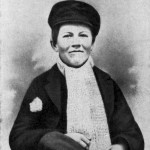 Although he was the last of seven children, Thomas Alva Edison was born into a largely empty household. February 11, 1847, was a cold, snowy night in the tiny village of Milan, Ohio, not far from the shores of Lake Erie. Edison’s mother, Nancy, who seemed always to be wrapped in black mourning garb, was eager to have more children to replace those who had not survived. One son, Carlile, died in 1842, when he was only 6 years old. A second son, 3-year-old Samuel Ogden, perished a year later while Nancy was pregnant with daughter Eliza. Eliza also lived only three years, passing away in late 1847, when Thomas was still an infant.
Although he was the last of seven children, Thomas Alva Edison was born into a largely empty household. February 11, 1847, was a cold, snowy night in the tiny village of Milan, Ohio, not far from the shores of Lake Erie. Edison’s mother, Nancy, who seemed always to be wrapped in black mourning garb, was eager to have more children to replace those who had not survived. One son, Carlile, died in 1842, when he was only 6 years old. A second son, 3-year-old Samuel Ogden, perished a year later while Nancy was pregnant with daughter Eliza. Eliza also lived only three years, passing away in late 1847, when Thomas was still an infant.
The arrival of “Little Al,” as he was known in his youth, was a welcome sight. Frail and burdened with an unusually large (though “well-shaped”) head, Edison struggled to survive a sickly childhood. The doctors feared he had something they called “brain fever.” Mostly he struggled alone; his eldest sister, Marion, often his only real companion, was already an adult when he was born. In 1849, when she was 20 and he just 2 years old, she married and moved away. Edison never forgave her new husband for taking Marion from him. His older brother William Pitt (named for the English statesman) and sister Harriet Ann moved out of the house not long after. Little Al was essentially raised as an only child.
His older siblings were born in Vienna, Ontario, a mirror of Milan on the northern shore of Lake Erie. Edison’s great-grandfather John, who lived to be a feisty 102 years old, was a Tory fighting on the British side in the American Revolution before barely escaping into Canada ahead of the noose. Edison’s father, Samuel, continued the family tradition of rebellion, this time against the Canadian government. Many years later, Edison remarked that his father had “always been a rebel, a regular red-hot copperhead Democrat, and [had] General Jackson as his hero.” Samuel Edison’s actions once again made emigration a necessary, and rather sudden, option for survival. He had joined with the losing side of the short-lived Mackenzie Rebellion of 1837 and escaped Canada on the run, stopping off briefly in Michigan before settling in Milan. John’s family soon joined him. With new children on the way, Samuel began the next phase of his life. Little Al—named Alva in honor of Captain Alva Bradley, a family friend and ship owner on the Great Lakes who had helped the family escape Canada—was the only one of the Milan-born children to survive.
[Adapted from my book, Edison: The Inventor of the Modern World.]

Lincoln: The Fire of Genius: How Abraham Lincoln’s Commitment to Science and Technology Helped Modernize America is available at booksellers nationwide.
Limited signed copies are available via this website. The book also listed on Goodreads, the database where I keep track of my reading. Click on the “Want to Read” button to put it on your reading list. Please leave a review on Goodreads and Amazon if you like the book.
You also follow my author page on Facebook.
David J. Kent is President of the Lincoln Group of DC and the author of Lincoln: The Fire of Genius: How Abraham Lincoln’s Commitment to Science and Technology Helped Modernize America and Lincoln: The Man Who Saved America.
His previous books include Tesla: The Wizard of Electricity and Edison: The Inventor of the Modern World and two specialty e-books: Nikola Tesla: Renewable Energy Ahead of Its Time and Abraham Lincoln and Nikola Tesla: Connected by Fate.










